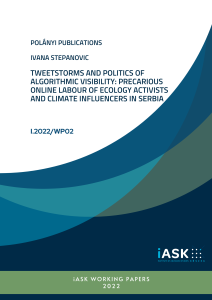Research & Studies
 About the Author
About the Author
Ivana Stepanovic (Serbia) is a Research Fellow at the Institute of Criminological and Sociological Research since 2014. She holds a PhD in Anthropology from the University of Belgrade, MA in Human Rights and Democracy in South-East Europe from the University of Sarajevo and University of Bologna and BA in Philosophy from the University of Belgrade. Her previous research has focused on the issue of privacy in the context of digital technologies. Currently, she is mainly interested in issues concerning privacy and security on the internet, the role of new media in political, cultural, and economic changes, particularly in South-East Europe, the role of algorithms in policing the internet and the impact of digital surveillance on everyday life. She is also interested in topics concerning privacy and security in prisons and the role of digital technologies in the transformation of labour. She is a permanent iASK Fellow since 2022.
Abstract
Eco activism in Serbia and the rest of the world relies on the use of hashtags. In the semiosphere of the internet, they appear as algorithmic signifiers that are determining the visibility and distribution of digital content, but they also migrate to the physical world where they occasionally get transformed into powerful political slogans. From protest banners to tweetstorms, hashtags are the tools of resistance that are at the same time empowering and disempowering. They allow the dissemination of ecology activist narratives in the sphere of social media, but at the same time, they lead to the exploitation of activists as digital workers. Social media persistently undermine their own democratic principles by imposing algorithmic organisation of visibility which relies on data surveillance and rigorously adheres to the logic of the market and digital prosumption. This paper investigates how protesters against lithium mining in Serbia use hashtags on Twitter and on street protests to influence political decision-makers while striving to please the algorithms and gain visibility. Digital ethnography offers a unique perspective of the processes of digital prosumption and the role of algorithms in ecology activism that spills over from the realm of social media into physical spaces where activists gather to protest.
I.2022/WP02Download